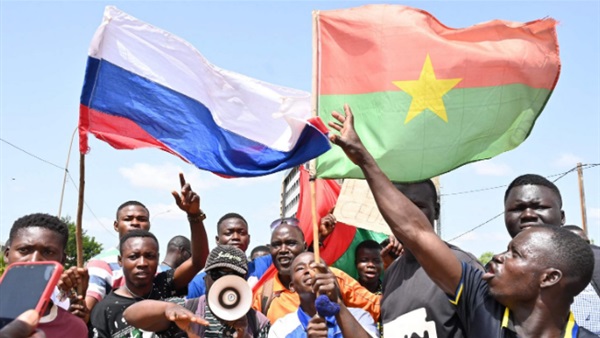Putin lies in the shadows after France loses sway in west Africa

Moscow has
revealed its next target in resource-rich west Africa, where a deteriorating
security environment is helping the Kremlin wrench influence over former French
colonies from Paris.
Niger and
its uranium mines are next, a series of pro-Putin voices have declared via the
Telegram messaging service.
The same
voices were chattering ahead of the coup d’état that toppled Burkina Faso’s
government last month. Kremlin cronies were quick to exploit the chaos, backed
by demonstrators waving Russian flags outside the capital’s French embassy. The
fresh challenge will alarm French diplomats struggling to come to terms with
Moscow’s exploitation of the chaos caused by a worsening insurgency in the
Sahel.
Niger, the
region’s only former French colony where Paris still holds sway, is essential
for the nuclear power stations that provide 70 per cent of France’s
electricity. In 2020, 34.7 percent of the uranium used in French reactors was
from the west African country. If Paris lost this supply, the energy crisis
would grow significantly worse.
Although few
observers believe that Putin has the clout to run the region as Paris once did,
many fear the growing presence of the Russian paramilitary force Wagner will
leave jihadists as the uncontested masters of vast swathes of territory, notably
in the Sahel.
“I think France is at a major and long-term
turning point in its relations with west Africa,” said Élie Tenenbaum, director
of the Centre of Security Studies at the French Institute of International
Relations in Paris. He said Russia was exploiting the uncertainty to pursue a
strategy launched a decade ago in Africa of working with local factions
“unhappy with what the West has to offer”.
The likes of
Mali, Senegal, Cameroon, the Ivory Coast, Niger and Chad gained independence in
the 1960s, but for decades Paris continued to pull strings in the countries
that were once part of its empire. In Mali the French military intervened in
2013 to prevent jihadists marching on the capital, Bamako.
Now,
however, France is losing its regional pre-eminence. This summer, the last of
the 5,000 or so troops that had been sent to Mali left the country, completing
what Le Monde called a “diplomatic and military humiliation”. It followed a
putsch that brought in an anti-French regime. Not only did Abdoulaye Maïga, the
new leader, describe President Macron’s government as a “junta serving
obscurantism” but Mali agreed with Wagner for at least 1,000 Russian
mercenaries to replace French forces in combating jihadism.
In the
Central African Republic, Wagner has deployed about 2,000 mercenaries since
2018 against the backdrop of religious conflicts and a diplomatic shift away
from France.
In Burkina
Faso, Captain Ibrahim Traoré, the 34-year-old officer who took power last
month, said the country wanted “other partners”. Yevgeny Prigozhin, Wagner’s
founder and an oligarch close to President Putin, was quick to offer “support”
to Traoré. The state-backed mercenary group is reported to be operating in nine
African countries, and Burkina Faso is likely to be the tenth.
The US ambassador
to the UN has linked the brisker pace of Wagner’s influence to Moscow’s war in
Ukraine. “Rather than being a transparent partner and improving security,
Wagner exploits client states who pay for their heavy-handed security services
in gold, diamonds, timber, and other natural resources — this is part of Wagner
Group’s business model,” Linda Thomas-Greenfield recently told a UN security
council briefing. “We know these ill-gotten gains are used to fund Moscow’s war
machine in Africa, the Middle East, and Ukraine.”
Yet with
Russia embroiled in the war in Ukraine and its economy in recession, many doubt
that it can become the dominant force in west Africa. Idayat Hassan, of
Nigeria’s Centre for Democracy and Development, said the Central African Republic
shows how sentiments can change: “The Russians were welcomed . . . but are now
loathed for their plundering of natural resources and human rights violations
that have made the lives of its citizens worse.”
Tenenbaum
said that with France in retreat and Russia incapable of exercising long-term
control, there would be one winner. “We are heading straight for a jihadist
expansion with entire stretches of territory that are going to pass completely
under jihadist control.







